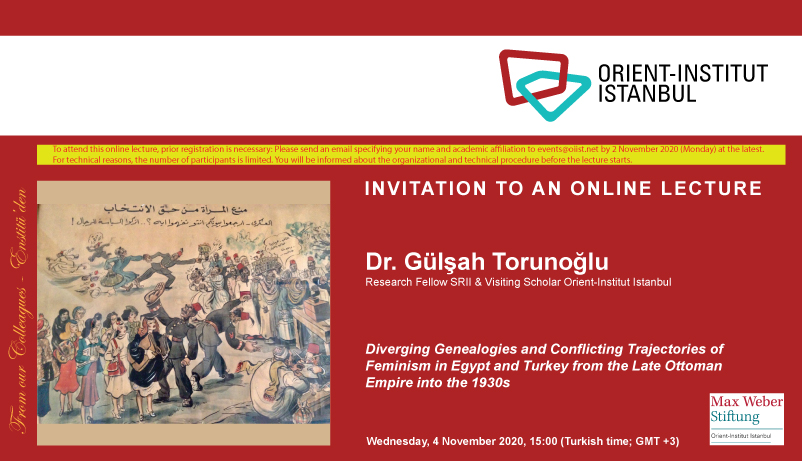November, 2020
Details
To attend this online lecture, prior registration is necessary: Please send an email specifying your name and
Details
To attend this online lecture, prior registration is necessary: Please send an email specifying your name and academic affiliation to events@oiist.net by 2 November 2020 (Monday) at the latest.
For technical reasons, the number of participants is limited. You will be informed about the organizational and technical procedure before the lecture starts.
Although historiography in Middle Eastern women’s history has developed rapidly in the last decades, scholarship on the comparative history of feminism in the Middle East has been severely limited. Just as important, there is a century-long lacuna in the history of the women’s movements in Turkey, with relatively few studies examining the period 1880-1980. Egypt and the Ottoman center (later Turkey) are well suited for a comparative examination of evolving feminist discourses, as their two centers of cultural production, Cairo and Istanbul, maintained a constant and mutual flow of local interaction during the late-nineteenth and the early-twentieth centuries.
This talk offers a comparative analysis of the patterns and distinct phases in which Egyptian and Turkish feminists engaged with both religious and secular reform traditions during this period. It argues that in societies with a strong heritage of secular liberal reform, wherein progressive tradition is engineered by intellectuals and cadres of officials, such as in the Ottoman center and in the Turkish Republic, feminism becomes a state-centric political project and an intellectual enterprise in which more conservative manifestations of feminism are side-lined for the sake of a swift rate of progress. It will be argued that in societies with a strong heritage of Islamically grounded modernization and social advances, such as in Egypt, on the other hand, feminism is rooted in, nourished by, and highly responsive to social, cultural, and religious norms, fostering social mobilization at a broader stratum, yet at a much slower, or more gradual, rate of progress.
Dr. Gülşah Torunoğlu is a research fellow at the Swedish Research Institute (SRII) and a visiting scholar at the Orient-Institut Istanbul, where she is revising her dissertation to publish as a monograph. She holds a PhD in History from Ohio State University (2019) specializing in comparative women’s history in the Middle East. Previously, she held visiting fellow positions at the University of Wisconsin-Madison, the American University in Cairo, and at Princeton University. During the 2019-2020 academic year, she was a Postdoctoral Fellow at Koç University’s Research Center for Anatolian Civilizations (ANAMED). Over this past summer she also taught a course on “Women and Gender in Literature” at Koç University.
Based on two years of archival research in Turkey, Egypt, and the United Kingdom, Dr. Torunoğlu’s current book project, A Comparative History of Feminism in Egypt and Turkey, 1880-1935: Dialogue and Difference, establishes a dialogue between Turkish and Egyptian feminisms, compares nationalist versus Islamic trends among them, and takes stock of their interactions with and resistances to western feminisms. By bringing the evolution of the feminist discourse in Egypt and the Ottoman Empire into conversation with the secular and religious reform traditions in both countries in a comparative perspective, her work seeks to encourage a broader and more in-depth understanding of feminism in the Middle East, stripped from the dominant, nationalist narrative of its evolution.
Together with Prof. Hülya Adak (SU Gender) and Dr. Richard Wittmann (Orient-Institut Istanbul) Dr. Torunoğlu will be hosting a two-day online workshop next month titled “Mapping Gender in the Near East: What’s New and What’s Ahead in Ottoman and Turkish Women’s, Gender, and Sexuality Studies” (December 9-10, 2020).
Zeit
(Mittwoch) 15:00

